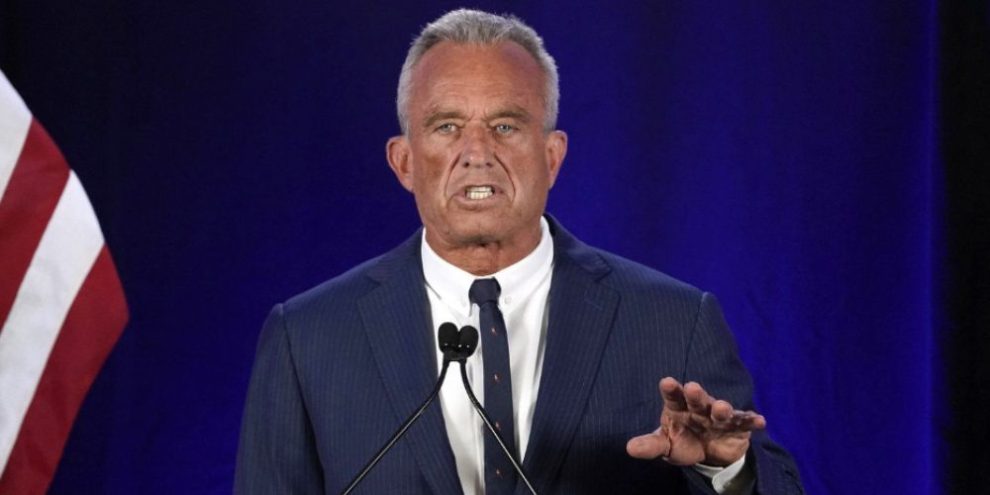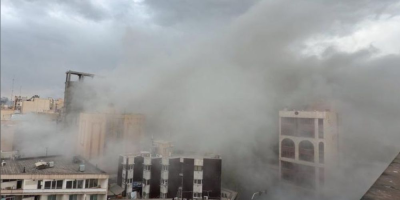
Robert F. Kennedy Jr. suspended his independent campaign for president Friday and endorsed Donald Trump, a late-stage shakeup of the presidential race that could give the former president a modest boost from Kennedy’s supporters.
Kennedy said his internal polls had shown that his presence in the race would hurt Trump and help Democratic nominee Kamala Harris, though recent public polls don’t provide a clear indication that he is having an outsize impact on support for either major-party candidate.
Kennedy cited free speech, the war in Ukraine and “a war on our children” as among the reasons he would try to remove his name from the ballot in battleground states.
“These are the principal causes that persuaded me to leave the Democratic Party and run as an independent, and now to throw my support to President Trump,” Kennedy said.
However, he made clear that he wasn’t formally ending his bid and said his supporters could continue to back him in the majority of states where they are unlikely to sway the outcome. Kennedy took steps to withdraw his candidacy in at least two states late this week, Arizona and Pennsylvania, but in the battlegrounds of Michigan, Nevada and Wisconsin, election officials said it’s too late for him to take his name off the ballot even if he wants to do so.
Kennedy said his actions followed conversations with Trump over the past few weeks. He cast their alliance as “a unity party," an arrangement that would "allow us to disagree publicly and privately and seriously.”
Hours after Kennedy made his announcement in Phoenix, Trump was to hold a rally in neighboring Glendale. Trump’s campaign teased that he would be joined by “a special guest,” though neither campaign responded to messages about whether Kennedy would be that guest.
A year ago, some would have thought it inconceivable that a member of arguably the most storied family in Democratic politics would work with Trump to keep a Democrat out of the White House. Even in recent months, Kennedy has accused Trump of betraying his followers, while Trump has criticized Kennedy as “the most radical left candidate in the race.”
Five of Kennedy’s family members issued a statement on Friday calling his support for Trump “a sad ending to a sad story.”
“We want an America filled with hope and bound together by a shared vision of a brighter future, a future defined by individual freedom, economic promise and national pride,” read the statement, which his sister Kerry Kennedy posted on X. “We believe in Harris and Walz. Our brother Bobby’s decision to endorse Trump today is a betrayal of the values that our father and our family hold most dear.”
Kennedy Jr., the son of the late Attorney General and Sen. Robert Kennedy and the nephew of President John F. Kennedy, acknowledged his decision had caused tension with his immediate family. He is married to actress Cheryl Hines.
“This decision is agonizing for me because of the difficulties it causes my wife and my children and my friends,” Kennedy said. "But I have the certainty that this is what I’m meant to do. And that certainty gives me internal peace, even in storms.”
The Kennedy and Trump campaigns have ramped up their compliments of each other and engaged in behind-the-scenes discussions in recent weeks, according to those familiar with the efforts. Both campaigns have spent months accusing Democrats of weaponizing the legal system for their own benefit. And both have hinted publicly that they could be open to joining forces, with the shared goal of limiting Harris' chances.
Last month, during the Republican National Convention, Kennedy’s son posted and then quickly deleted a video showing a phone call between Kennedy and Trump, in which the former president appeared to try to talk Kennedy into siding with him.
Talks between the two camps continued, with close Trump allies quietly lobbying Kennedy to drop out of the race and support the Republican nominee, according to a person familiar with the efforts who spoke on condition of anonymity to discuss private conversations.
Trump told CNN on Tuesday that he would “love” an endorsement from Kennedy, whom he called a “brilliant guy.” He also said he would “certainly” be open to Kennedy playing a role in his administration if Kennedy dropped out and endorsed him.
Kennedy's running mate, Nicole Shanahan, also suggested on a podcast this week that his campaign might “walk away right now and join forces with Donald Trump.” While she clarified that she is not personally in talks with Trump, she entertained the idea that Kennedy could join Trump's administration as secretary of the Department of Health and Human Services.
“I think that Bobby in a role like that would be excellent,” Shanahan said. “I fully support it. I have high hopes.”
Earlier Friday, Shanahan posted on X that she isn’t a Kamala Democrat or a Trump Republican.
“I’m an INDEPENDENT American who is endorsing ideas, not a person or a party,” she wrote. “I will continue working to give a voice to the voiceless and bring power back to the people.”
At Kennedy's Phoenix event, 38-year-old Casey Westerman, a Chandler, Arizona, resident who works in software sales, said she trusted Kennedy’s judgment and had planned to vote for him, but would support Trump if Kennedy said that was who he was endorsing.
“My decision would really be based on who he thinks is best suited to run this country,” said Westerman, who wore a “Kennedy 2024” trucker hat and voted for Trump in the last two presidential elections.
Kennedy first entered the 2024 presidential race as a Democrat but left the party last fall to run as an independent. He built an unusually strong base for a third-party bid, fueled in part by anti-establishment voters and vaccine skeptics who have followed his anti-vaccine work since the COVID-19 pandemic. But he has since faced strained campaign finances and mounting legal challenges.
Recent polls put his support in the mid-single digits. And it's unclear if he’d get even that in a general election, since third-party candidates frequently don’t live up to their early poll numbers when voters actually cast their ballots.
There's some evidence that Kennedy's staying in the race would hurt Trump more than Harris. According to a July AP-NORC poll, Republicans were significantly more likely than Democrats to have a favorable view of Kennedy. And those with a positive impression of Kennedy were significantly more likely to also have a favorable view of Trump (52%) than Harris (37%).
___
Associated Press writers Jill Colvin in New York, Michelle L. Price in Phoenix, Marc Levy in Harrisburg, Pa., Meg Kinnard in Chicago and Linley Sanders in Washington contributed to this report.
___ The Associated Press receives support from several private foundations to enhance its explanatory coverage of elections and democracy. See more about AP’s democracy initiative here. The AP is solely responsible for all content.





